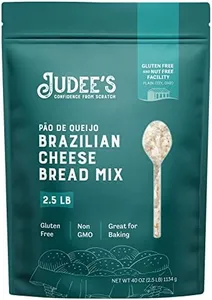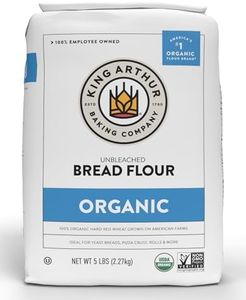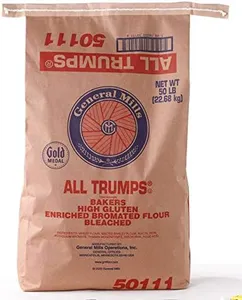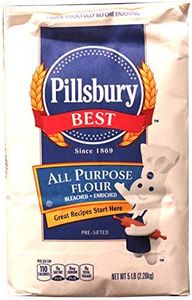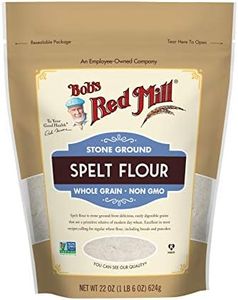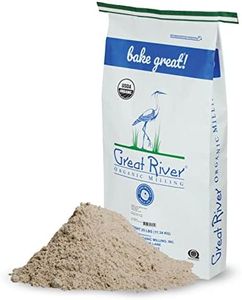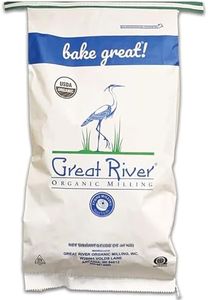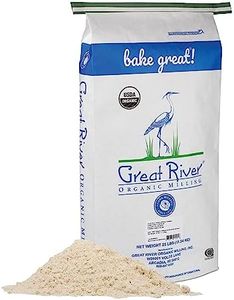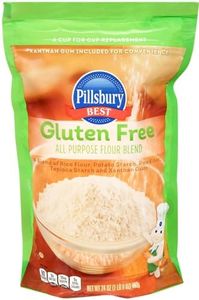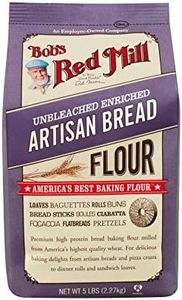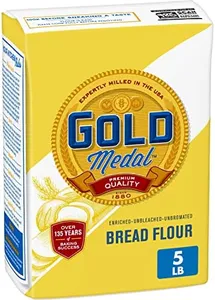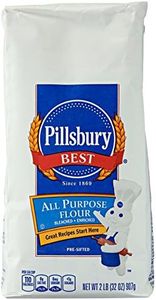10 Best Bread Flours 2025 in the United States
Our technology thoroughly searches through the online shopping world, reviewing hundreds of sites. We then process and analyze this information, updating in real-time to bring you the latest top-rated products. This way, you always get the best and most current options available.

Our Top Picks
Winner
King Arthur Unbleached Bread White Flour, 50 Pound
King Arthur Unbleached Bread White Flour is a solid choice for bakers looking for high-quality bread flour. With a protein content around 12.7%, it strikes a good balance for achieving the gluten structure needed for bread, resulting in a nice rise and chewy texture. The flour's gluten strength is also commendable, making it suitable for a variety of bread types, from rustic loaves to soft sandwich bread. The unbleached nature of the flour means it retains more natural flavor, which many bakers appreciate.
The milling process used by King Arthur ensures a consistent quality, allowing for reliable results in baking. Additionally, this flour is enriched, which adds nutritional value, making it a healthier choice for those looking to incorporate more nutrients into their baked goods.
However, there are a few drawbacks to consider. Some users may find the packaging size of 50 pounds to be quite large, making it less ideal for occasional bakers who don’t require such a high volume of flour. The flour is not gluten-free, so it won’t work for those who have gluten sensitivities or celiac disease. While the flour is known for its quality, it may be slightly more expensive than other options on the market, which could be a concern for budget-conscious bakers. This flour is excellent for dedicated bakers looking for quality and performance when making bread. Its strengths lie in its protein content, gluten strength, and milling process. Potential buyers should consider their baking frequency and dietary needs before purchasing.
King Arthur Unbleached Organic Bread Flour - High Protein 12.7% for Lofty Yeasted Breads, Non-GMO, Kosher Certified - Premium Baking Flour for Artisan Loaves, Pizza Dough, and Sourdough (5 lbs)
King Arthur Unbleached Organic Bread Flour is known for its high protein content of 12.7%, which is higher than many other national brands. This makes it an excellent choice for baking yeasted breads, as the higher protein ensures a stronger rise and better texture. Home bakers looking to make artisan loaves, pizza dough, and sourdough will find this flour particularly useful due to its versatility and quality.
The flour is non-GMO, USDA Organic Certified, and Kosher, meeting high standards for those concerned with dietary restrictions and food quality. Additionally, the absence of preservatives and the unbleached nature of the flour contribute to its appeal for health-conscious bakers.
King Arthur's reputation and rigorous testing suggest that it maintains a consistent performance. The 5 lbs packaging is practical for home bakers, though those baking in larger quantities might find it necessary to purchase multiple packs. This product is a solid choice for anyone looking to produce high-quality, flavorful bread at home, backed by a trusted brand with a long history in the baking industry.
General Mills Gold Medal All Trumps High Gluten Flour, 50 Pound
Most important from
294 reviews
The General Mills Gold Medal All Trumps High Gluten Flour is a strong contender for anyone looking to make high-quality bread. With high protein content, this flour is designed to provide excellent gluten strength, which is essential for creating bread with good structure and chewiness. This makes it particularly suitable for professional bakers or anyone serious about their bread-making.
The 50-pound package size is great for bulk use, reducing the frequency of repurchasing, though it might be cumbersome for small kitchens or infrequent bakers. Its high gluten strength and solid performance in baking make it a reliable option for making bread, particularly for those who need larger quantities.
Most important from
294 reviews
Buying Guide for the Best Bread Flours
Choosing the right bread flour is essential for baking delicious and well-textured bread. The type of flour you select can significantly impact the taste, texture, and rise of your bread. Understanding the different types of bread flours and their key specifications will help you make an informed decision that suits your baking needs and preferences.FAQ
Most Popular Categories Right Now
